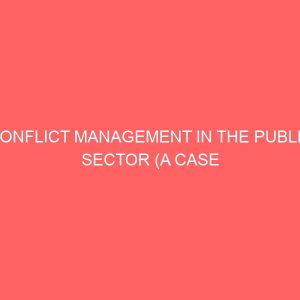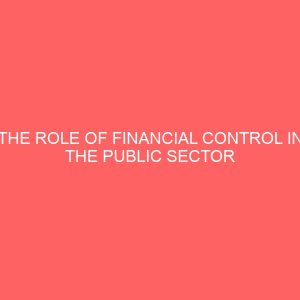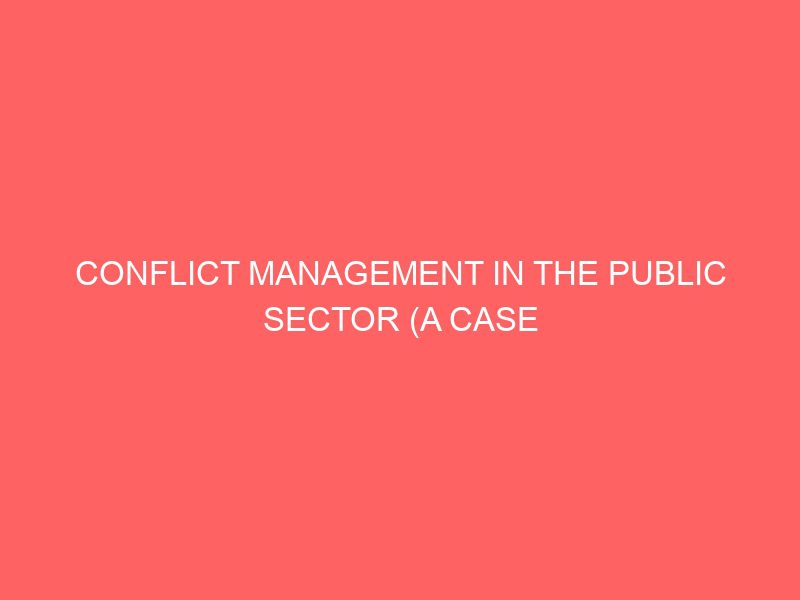Description
ABSTRACT
The researcher chose the Topic conflict management in the public sector A case study of Enugu north local government The researcher wanted to know how conflict can be managed in the public sector but discover the problem of conflict who lack some of the qualities and ability. Therefore there is need for realization of these public sector organs and to understand the dynamic of a particular conflict if it moves from prodnomal to resolution stage we are and implement appropriate remedies conditions that the change motivators are aware that this has not been the case in the local government. As a matter of fact it is clear to all that the aims of establishing the local government in Nigeria which is to be an effective third tier of government has not been realized. There is no development and introduction of a standard conflict management tool, for effective conflict management in the country.
In doing this, the researcher developed major research questions aimed at the effect of conflict management. These questions were administered in the form of questionnaire to officers who were selected as sample of the population.
Apart from primary data collection through questionnaire and interview secondary data were also collected. Tables and percentages were used in organizing and presenting data collection. Data analysis and interpretation revealed that in the guidline federal government emphasizes that responsibilities should be clearly defined and that local government should have adequate financial resources to meet their obligations which are mainly to stimulate development at the grass root.
Finally, the development and introduction of a standard conflict management tool, for use in the public sector organizations should be perceived as being very necessary for effective conflict management in the country.
CHAPTER ONE
INTRODUCTION
The Nigerian society is undergoing a rapid transition in addition to the inevitable and unusually gradual transformation processes that affect all social system. The institutions economic, political, legal etc of the Nigerian society, are being deliberately and hurriedly reformed to avoid the pitfalls of the past. New decisions and programmes are established and new strategies adopted all in an effort to achieve a social order.
One of the on going strategies to do this, is the reform introduced into the public sector by the office of the chief of general staff C.G.S making the local government an effective third tier of the government. Usually, such reforms tend to point to one form of organizational conflict with regards to the Nigerian public sector, it arises out of the inherent disposition of the system to distort the political and administrative processes by its decisions or operations. It also arises form situational. Uncertainties and inadequacies of an organization. There could be lack of understanding of the full implication of established programmes or a deliberate dinging to politics established primarily to protect Institutionalized class relations. Any such conflict is capable of distorting the achievement of the desired objective of the public sector. Part of the process of ensuring success in the achievement of goals of these public sector organization is to understand the dynamics of such conflict and apply appropriate remedies, provided that the change motivators are genuine and determined.
It is a known fact that the understanding of the dynamics of crisis is lacking in the public sector of the Nigerian economy. It is equally true that the chief executive and administrators in the public sector are involved in the crisis management. From the foregoing, if is seen that there is no effective Tool for crisis management in the Nigerian public sector because of its large size. It is pertinent that an organization within this sector is used as a reference point in order to limit the wideness of this study. The Enugu North local Government ENLG has been chosen for proper representation of the public sector organization in the economy.
In this thesis, we intend to identify a few conflict situation that could hit ENLG and through the research, rank them in order of their probability of occurring.
I will then use the conflict with the highest probability, to develop a conflict management tool for organizations with the public sector of the Nigerian economy.
1.1 BACKGROUND OF STUDY
The local government has been characterized by instability and discontinuity emanating from one conflict situation or the other. These conflict are often prompted by the activity of the federal government and other environmental factors which usually lead to complete dissolution and or take over of functions of the management group by government appointed administrators. In order words, the Local Government of this country have always been subjected to the whims and caprices of the federal government. They were not allowed to make their own decisions as to contributing to the Nigerian economy or either way they give enough financial assistance authority to be accountable to the devise in herent in such local government.
The various government reforms are aimed at stabilizing and rationalizing local government organization or corporations. It is quite unfortunate however that the chosen implementation strategies seems to have resulted in unanticipated policy outcomes. As a matter of fact it is clear to all that the aims of establishing the local government in Nigeria. Which is to be an effective third tier of government has not been realized. It is believed that this is mainly due to the inability of the local government to effectively manage the forms of conflict that afflicted it since their inception. It is against this background that conflict management and local government is being investigated. Every conflict has four 4 main stages and allowing each crisis to pass through the four stages has been the bare of effective local government in Nigeria. The four stages of conflict include:
Prodromal stage early warring stage
Acute stage
Chronic stage
Resolution stages
Conflict management aim at avoiding the acute and chronic stages of conflict. A crisis is said to be effectively managed if it moves from prodromal to resolution stage we are aware that this has not been the case in the local government.
Crisis have been known to have gone through the four stages with inevitable consequences. If we take a look at the second republic and early part of the aborted their republic 19881989 there were various crisis among which were.
Financial conflict
Power conflict
Manpower conflict
Political conflict
The above conflict, were unfortunately allowed to go through the four stages and this had their unpleasant effects on the local government in the country. For example, the Enugu North local government administration was engulfed by conflict during the year 1988 and 1989 this conflict went through the full cycle which cumulated in the intervention of both the state and federal government leading to the supension of its popularly elected chairman.








Reviews
There are no reviews yet.